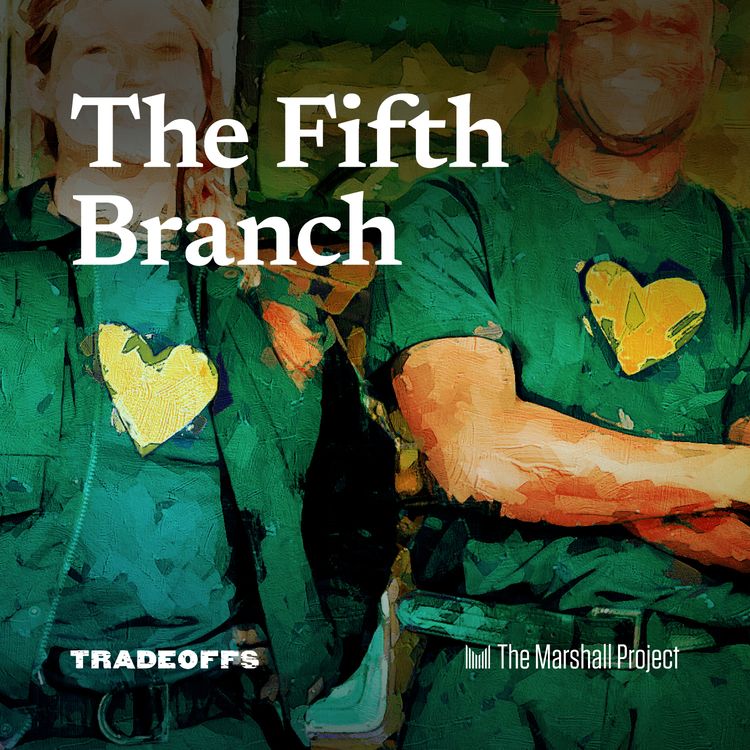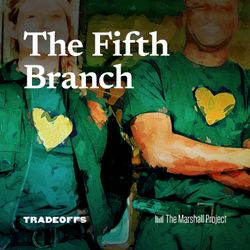Share

The Fifth Branch
Tradeoffs Presents: The Fifth Branch
EMS, Fire, Police and the 911 Call Center make up the existing four branches of the public safety system. A special series from Tradeoffs and the Marshall Project explores how a city radically changes its response to people in crisis, by creating a fifth branch.
Nearly half of the country’s 50 largest cities—including San Francisco, New York, Houston, Chicago—have launched programs to send unarmed responders to 911 calls historically handled by cops. In the process creating a new generation of first responders made up of clinicians, EMTs and unarmed mental health workers all responding to people who struggle with addiction, homelessness and mental illness.
To understand this work we head to Durham, North Carolina, which has—in the face of skepticism and downright opposition—built one of the most comprehensive programs in the country.
How did Durham pull off what so many cities have struggled to do? Join Tradeoffs and The Marshall Project for our new series The Fifth Branch as we examine this groundbreaking work and the challenges it’s facing, both in Durham and around the country. Episodes drop July 18, July 25 and August 1.
Learn more on our website.
Want more Tradeoffs? Sign up for our free weekly newsletter featuring the latest health policy research and news.
Support this type of journalism today, with a gift.
More episodes
View all episodes

1. The Fifth Branch: Convincing the Cops
35:17||Season 1, Ep. 1How do you convince police officers that it makes sense to send unarmed mental health workers to some 911 calls?Guests:Patrice Andrews, Police Chief, Durham Police DepartmentRyan Smith, Director, Durham Department of Community SafetySgt. Dan Leeder, Durham Police DepartmentAbena Bediako, Clinical Manager, Durham Department of Community SafetyChristie Thompson, Staff Writer, The Marshall ProjectEMS, Fire, Police and the 911 Call Center make up the existing four branches of the public safety system. A special series from Tradeoffs and The Marshall Project explores how a city radically changes its response to people in crisis, by creating a fifth branch. Nearly half of the country’s 50 largest cities - including San Francisco, New York, Houston, Chicago - have launched programs to send unarmed responders to 911 calls historically handled by cops. In the process creating a new generation of first responders made up of clinicians, EMTs and unarmed mental health workers all responding to people who struggle with addiction, homelessness and mental illness. To understand this work we head to Durham, North Carolina, which has - in the face of skepticism and downright opposition - built one of the most comprehensive programs in the country.How did Durham pull off what so many cities have struggled to do? Tradeoffs and The Marshall Project examine this groundbreaking work and the challenges it’s facing, both in Durham and around the country.Learn more on our website.Want more Tradeoffs? Sign up for our free weekly newsletter featuring the latest health policy research and news.Support this type of journalism today, with a gift.
2. The Fifth Branch: Keeping People Safe
39:42||Season 1, Ep. 2We look at HEART’s impact on the safety of Durham residents in crisis, the mental health workers responding, and the police.Guests:David Prater, Peer Support Specialist, Durham Department of Community SafetyRyan Smith, Director, Durham Department of Community SafetyYolanda, Durham residentSgt. Dan Leeder, Durham Police DepartmentPatrice Andrews, Police Chief, Durham Police DepartmentChristie Thompson, Staff Writer, The Marshall ProjectEMS, Fire, Police and the 911 Call Center make up the existing four branches of the public safety system. A special series from Tradeoffs and The Marshall Project explores how a city radically changes its response to people in crisis, by creating a fifth branch. Nearly half of the country’s 50 largest cities - including San Francisco, New York, Houston, Chicago - have launched programs to send unarmed responders to 911 calls historically handled by cops. In the process creating a new generation of first responders made up of clinicians, EMTs and unarmed mental health workers all responding to people who struggle with addiction, homelessness and mental illness. To understand this work we head to Durham, North Carolina, which has - in the face of skepticism and downright opposition - built one of the most comprehensive programs in the country.How did Durham pull off what so many cities have struggled to do? Tradeoffs and The Marshall Project examine this groundbreaking work and the challenges it’s facing, both in Durham and around the country.The Marshall Project's Christie Thompson reports on the state of alternative crisis response across the country.Learn more on our website.Want more Tradeoffs? Sign up for our free weekly newsletter featuring the latest health policy research and news.Support this type of journalism today, with a gift.
3. The Fifth Branch: Last Line of Care
40:32||Season 1, Ep. 3Alternative response teams are being asked to tackle vexing problems: mental illness, homelessness, addiction. How much can they actually do? We explore how Durham grapples with connecting people to long-term care and support, and where the city draws the line between crisis response and social services.Guests:Ryan Smith, Director, Durham Community Safety DepartmentSammetta Cutler, Peer Support Specialist, Durham Community Safety DepartmentSarah Hall, Durham residentDavid Prater, Peer Support Specialist, Durham Community Safety DepartmentJohn Warasila, Real estate developer and architect, Alliance ArchitectureBo Ferguson, Deputy City Manager, DurhamPatrice Andrews, Police Chief, Durham Police DepartmentChristie Thompson, Staff Writer, The Marshall ProjectAllison Casey, EMT, Durham Community Safety DepartmentEMS, Fire, Police and the 911 Call Center make up the existing four branches of the public safety system. A special series from Tradeoffs and The Marshall Project explores how a city radically changes its response to people in crisis, by creating a fifth branch. Nearly half of the country’s 50 largest cities - including San Francisco, New York, Houston, Chicago - have launched programs to send unarmed responders to 911 calls historically handled by cops. In the process creating a new generation of first responders made up of clinicians, EMTs and unarmed mental health workers all responding to people who struggle with addiction, homelessness and mental illness. To understand this work we head to Durham, North Carolina, which has - in the face of skepticism and downright opposition - built one of the most comprehensive programs in the country.How did Durham pull off what so many cities have struggled to do? Tradeoffs and The Marshall Project examine this groundbreaking work and the challenges it’s facing, both in Durham and around the country.Learn more on our website.Want more Tradeoffs? Sign up for our free weekly newsletter featuring the latest health policy research and news.Support this type of journalism today, with a gift.